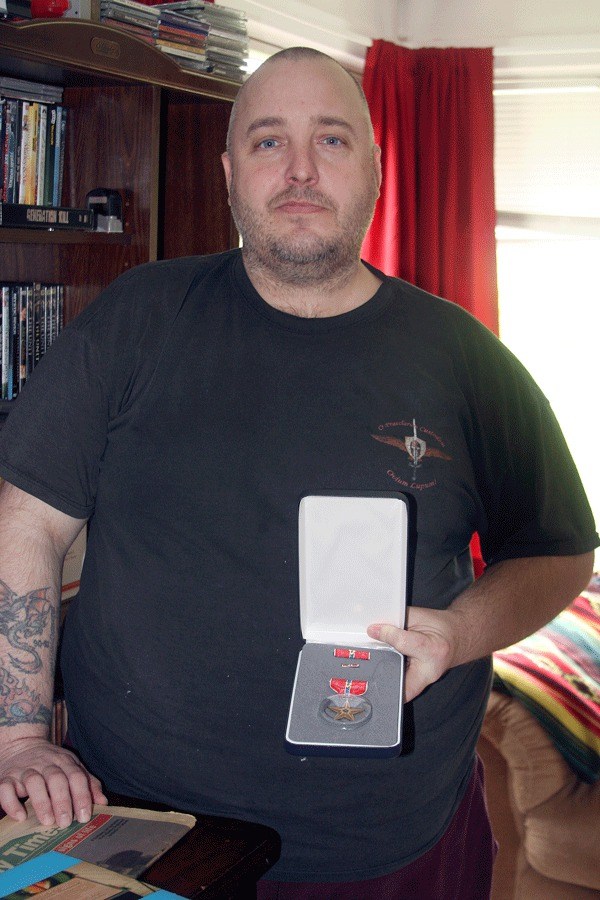It’s amazing how a person who has seen and suffered so much can still take pleasure in life’s simple joys and move forward.
Oak Harbor Army veteran Dennis Skaggs is able to laugh about his 4-year-old daughter’s Siamese cat named Chicken Nugget just minutes after discussing his nightmares about the stench of burning human flesh.
Skaggs grew up in Louisville, Ky., and left for military training the day after he graduated from high school in 1989. He was an infantry soldier and spent three years in Germany and later traveled throughout Iraq, Kuwait and Saudi Arabia as the Gulf War unfolded. He spent three weeks stationed in the burning oil fields engulfed in darkness.
“It would be 12 noon but looked like midnight,” Skaggs said. “It was pitch black from all the smoke.”
On Feb. 27, 1991, Skaggs was driving a Bradley Fighting Vehicle around 2 a.m. in Iraq when his group was mistaken as the enemy by other American troops. A storm of friendly fire struck Skaggs and his fellow men. A round came into the vehicle and Skaggs was hit on his back and neck. A round came in behind Skaggs’ seat and took off his passenger’s legs. Skaggs’ roommate’s face and hands were melted. Four men in his group were killed as a result of the attack.
During the chaos, Skaggs tried to lower a ramp from the vehicle to let the men escape, but it had gotten bent and wouldn’t open. Though Skaggs couldn’t feel the left side of his body and was fighting multiple wounds himself, he managed to open up the front hatch and throw himself from the vehicle. He said he grabbed a sludge hammer, climbed on the top of the vehicle and beat the ramp open.
“You just have to hope and pray in a situation like that,” Skaggs said. “I thought, ‘Can I feel my feet? Can I feel my arms? Okay, I’m alive,’ and then adrenaline just took over.”
Skaggs had been cross-trained as a medic and was left to tend to the hurting men for about three hours by himself while he waited for help to arrive. He was later awarded the Bronze Star for heroism in ground combat, but Skaggs said he isn’t able to feel like a hero.
“A lot of what I took away from the experience was guilt, that I could have done more to save those men,” he said.
When the war ended, Skaggs was sent back to the states. He moved up to Whidbey to be closer to his brother who had been injured in a motorcycle accident about five years ago and has been living on the island ever since. But the memories from his time overseas still weigh heavily on his mind, and Skaggs said he suffers with post-tramuatic stress disorder and goes to therapy to learn healthy ways to deal with its effects.
Skaggs said he wakes up in the middle of the night with the smell of charred skin in his nostrils and whenever he catches a waft of burning trash or hears a loud bang it brings him right back to the war.
“These things are always going to be with you,” he said. “You always think about them.”
Skaggs worked as an electrician for a while but later had to stop his duties due to war-related disabilities. Now, he’s a full-time student and is pursuing a degree in human resources. He said he’d like to be able to counsel veterans someday. Currently, he is in a work study program and volunteers at the American Legion.
“Nobody was there to tell me to do this or file for these benefits when I got home,” Skaggs said. “With two wars going on now, there’s going to be a lot of boys and girls who need help.”
Skaggs said he will spend his Memorial Day remembering the friends he lost in the war and spending time at the American Legion. He hopes others will remember all the men and women who have served in the past as well.
“With so much going on right now, people tend to forget about the wars that happened before, but if you don’t talk about the past you’re doomed to repeat it,” he said. “Just remember everybody. You never know who is in your community. Take time to think about who is next to you. Go up to veterans and just say thank you.”



